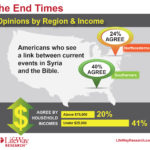By Bob Smietana
NASHVILLE, Tenn. — The threat of airstrikes against Syria has more than a few Americans thinking about the end of the world.
A recent poll from Nashville-based Lifeway Research found that almost one in three Americans see Syria’s recent conflict as part of the Bible’s plan for the end times.
One in four think that a U.S. military strike in Syria could lead to Armageddon. One in five believes the world will end in their lifetime.
Those results surprised Ed Stetzer, president of Lifeway Research.
Previous U.S. military action, like the war in Afghanistan or air strikes during 1990s war in Bosnia, didn’t get the same reaction, said Stetzer. But the fact that Syria shares a border with Israel, and is specifically mentioned in the Bible, has people thinking about the end times.
“We weren’t talking about Armageddon during the air strikes on Bosnia,” he said.
Israel and the End Times
Israel plays a major role in biblical prophecy, particularly in the Christian theology known as premillennial dispensationalism.
That theology inspired the best-selling Late Great Planet Earth in the 1970s as well as the Left Behind book series. A big budget remake of Left Behind is currently in the works.
Most premillennial dispensationalists believe Christians will instantly disappear from the earth during an event called the rapture, followed by seven years of war and catastrophe. After the battle of Armageddon, Jesus will return and set up his kingdom on earth.
Stetzer said he could see why linking Bible prophecy to Syria is appealing to many Christians.
It’s not that Christians want the world to end or want to see airstrikes, which will lead to suffering, Stetzer said. But they do want Jesus to return to set things right.
“For Christians, the end of the world doesn’t mean despair,” he said. “The end is really a new beginning.”
Differing opinions
Lifeway Research asked three questions about Syria and the end of the world as part of a telephone survey of 1,001 Americans conducted September Sept. 6-10, 2013.
Thirty-two percent of those polled agree with the statement, “I believe the battles in Syria are all part of the prophecies of the Book of Revelation,” Forty-nine percent disagree.
Twenty-six percent of those surveyed agree with statement, “I believe that U.S. military intervention in Syria might lead to the Battle of Armageddon that’s spoken about in the Book of Revelation.”
Women (36 percent) are more likely than men (28 percent) to see a link between current events in Syria and the Bible.
Those in the South (40 percent) and with household incomes under $25,000 (41 percent are more likely to see Syria’s woes in the Bible. Those in the Northeast (24 percent) or with incomes over $75,000 (20 percent) are more skeptical.
The biggest difference came when people responded to the statement, “I believe the world will end in my lifetime.”
Overall, 18 percent agree while 70 percent disagree.
But 30 percent of those with under $25,000 in household income agree. By contrast, 9 percent of those in households over $75,000, agree with that statement.
Religion and age also played in a role in how people responded to the poll.
Those who attend worship once or twice a month are more likely to see a tie between Syria’s trouble and the book of Revelation (51 percent agree), as are evangelical, born again, and fundamentalist Christians (58 percent agree.)
Fewer of those who rarely (25 percent) or never attend (14 percent) agree.
Older Americans are more likely to think U.S. airstrikes could lead to the battle of Armageddon, with 34 percent of those over 65 agreeing. Only 21 percent of those 18 to 29 agree.
Younger Americans, however, are more likely to think the world would end in their lifetime. Twenty-four percent of those 18 to 29 agree, as opposed to only 15 percent of those over 65.
About a third (32%) of evangelical, born-again, fundamentalist Christians believe the world will end in their lifetime.
The Rev. Mark Hitchcock, pastor of Faith Bible Church in Edmond, Okla., believes the Bible does predict future events in the Middle East.
But Hitchcock, who teaches about Bible prophecy at Dallas Theological Seminary—an institution historically connected to dispensationalism– and authored The End: A Complete Overview of Bible Prophecy and the End of Days, doesn’t think the trouble in Syria was predicted in the Bible.
Hitchcock believes people want answers in troubled times. Economic hard times, political unrest and violence overseas have many Americans fearful, he said.
That makes them more likely to see unrest in the Middle East as a sign that God is acting in the world.
“They want to know that God is in charge,” he said. “They want to know that someone has his hands on the wheel.”










